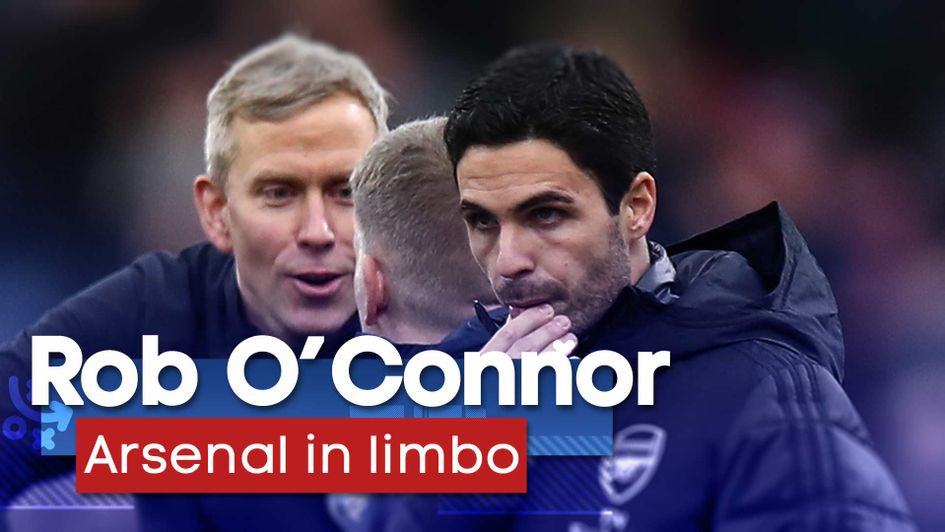Rob O'Connor analyses the situation at Arsenal, where there is no quick fix for Mikel Arteta to a problem that has been years in the making.
‘It’s always darkest before the dawn’ is a blithely misleading, coquettishly optimistic piece of mollycoddling. Proper darkness – the real deal, where you forget the feel of light against your skin and where the glow at the end of the tunnel doesn’t get close to penetrating – takes time to shift. That dank, ugly crust that’s collected overnight must be scraped from the eyes. Joints need more than a moment to unstiffen.
So too football clubs in a hole don’t suddenly burrow up to the surface. That telepathic link between midfield creators and centre-forward runners doesn’t flicker back on in a single instant, nor does the chaos of a back-four – or a back-three with advancing wing-backs, or a holding central defender with two deep-lying midfielders, or whatever other half-prepared, semi-understood piece of defensive jiggery-pokery has rotated into vogue on any given weekend – doesn’t simply cohere into a working rearguard in the arbitrary time it takes for the sun to rear up over the Emirates Stadium Clock End. It is, simply, always darkest when it is darkest.
To that end, the Arsenal ‘revival’ under Mikel Arteta so far hasn’t looked much like a revival at all. The club have won one of their seven league games under their latest saviour. Their only tangible target for what remains of the season, qualification for the Champions League, is still an ethereally distant 10 points away.
"I will give every drop of blood for this football club to make it better." 🩸@Arsenal need a culture change and I'm ready for the challenge: https://t.co/T3MBcRQPnA pic.twitter.com/kCWDTYYN7l
— Sky Sports Premier League (@SkySportsPL) December 20, 2019
Between the Gunners and the top four lie the arid, uninviting plains of the Premier League’s mid-table. Amongst the obstacles are Everton, who were in the relegation zone the day Arteta was appointed, and Manchester United, whose own much publicized crisis hasn’t left them anywhere nearly as deeply entrenched in the table as Arsenal find themselves. A single bad weekend could see the team slip as low as 14th. This is that kind of dark; cloying, impenetrable, never ending.
Arsenal’s stasis may be a necessary part of their suffering. But, alternatively, it may not be stasis at all. A car rolling backwards has to apply the brakes before it can start to climb the hill.
Results haven't improved
Results since Arteta began work in December – one win, one defeat, five draws – don’t stand in isolation. Rather, they are a continuation of a run that has seen the team win twice in their last 17 in the league, stretching back through Freddie Ljungberg’s caretaker tenure and into the doomed last days of Unai Emery, whose ham-fisted labours are part of (but not wholly) the reason the lights went out in the first place around the Emirates. And all of it owes its genesis to the inertia of those last diminishing, life-sapping years of Arsene Wenger’s reign. Arsenal’s car has been rolling towards the lake now for years.
Immediate success in football terms has a tendency to also be short-term. The new-manager bounce inevitably loses its boing once the first burst of enthusiasm to impress gives way to the comforting caress of old habits. A quick fix to a complex problem, likely isn’t a fix at all.
A cruel result for @Arsenal?
— Sky Sports Premier League (@SkySportsPL) December 29, 2019
Mikel Arteta said losing to two late goals against Chelsea was difficult to take.
Arsenal 1-2 Chelsea report: https://t.co/Q0FxywSXjY pic.twitter.com/A3zvw6yVGV
That Arsenal are still 10th in the league is a less significant detail than the fact that they no longer resemble the omnishambles of the miserable last days of Emery. At times, the team has looked – borderline – to be improving. Against Chelsea in December, the ball hadn’t moved so fast across Arsenal’s pitch since the days when the Premier League trophy stood in the Highbury – yes, Highbury – trophy cabinet.
In the end, individual mistakes cost them the game, and they will likely continue to do so at times between now and May, simply because that’s how Arsenal’s muscle memory has been conditioned, the collective football brain made unsteady by years of slips and blunders.
Green shoots of recovery?
But sufficient shoots of green peeped through the turf to remind the club’s stakeholders what Arsenal is about – quick, clever football; bullish physicality; ambition; intuition; insolence; even honest to god enjoyment in the simple act of playing.
At one stage, Mesut Ozil – Arsenal’s invisible man – was flattened by two Chelsea players at once. And yet, the recalcitrant German was quickly up to play a sumptuous free-kick from which the hosts nearly scored, and thereafter was a constant background threat as Arsenal bewitched Chelsea with as relentless a 30 minutes as the Emirates has seen for years. Something of old Arsenal had clearly survived amongst the nuclear doom and toxic depression.
"We need to improve that a lot."
— Arsenal FC News (@ArsenalFC_fl) February 4, 2020
Mikel Arteta doesn't want Arsenal to be as sloppy as they were against Burnley pic.twitter.com/gTXeR7rb2S
Yes, this is also the team that laboured to leggy stalemates against Crystal Palace, against Sheffield United and last Sunday against Burnley. The 0-0 draw at Turf Moor, a dour non-contest in which Arsenal spurned a handful of chances then seemingly gave up on trying to win in favour of circular possession and trademark defensive stumbles, was as late-Arsene Wenger / Emery as anything fans have seen in recent years. That’s the thing about progress. It doesn’t unflinchingly move in straight lines, but rather winds at less than direct angles. Sometimes it appears not to be going anywhere at all.
It helps Arteta that these kinds of performances are no longer headline-worthy. Arsenal have for now slipped into a place just off the radar. There have been so many dropped points that points are no longer of concern, a de-valued currency at the end of a puff of hyperinflation.
It recalls the oxygen that was afforded to Chelsea’s champions of 2015 after Guus Hiddink was roped in to slowly repair the mess left behind by the sacked Jose Mourinho. With nothing immediate at stake, commitment to the long haul becomes the only game in town. Once you stop being good enough, but are not quite yet bad enough either, the spotlight recedes, the story shrinks back and a rare pressure vacuum opens up in which the necessary work of repairing a fallen giant can truly begin in earnest.
Arsenal will benefit from this quiet time, from the months left alone in the dark to tend to the re-circuiting of a club gone haywire. When the lights are slammed back on in August, the spotlight will fall on the club anew.
Follow Sporting Life on social media - find us on Facebook here or tweet @SportingLifeFC
Related football links
- Laura Woods column: Here's to you, Allan
- Alex Keble: How to fix Man City
- Pundit Panel: The VAR verdict
- Henderson favourite for PFA award
- Summer transfers set to happen
- Latest Paper Talk
- Our latest football tips
- Bruno Fernandes: What United will gain
- Super 6: Enter NOW!
- Fantasy Football: Pick your team now!
- Football results
- Latest football odds









